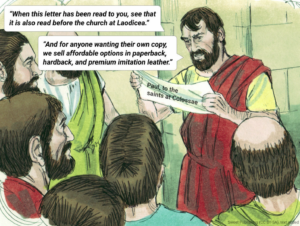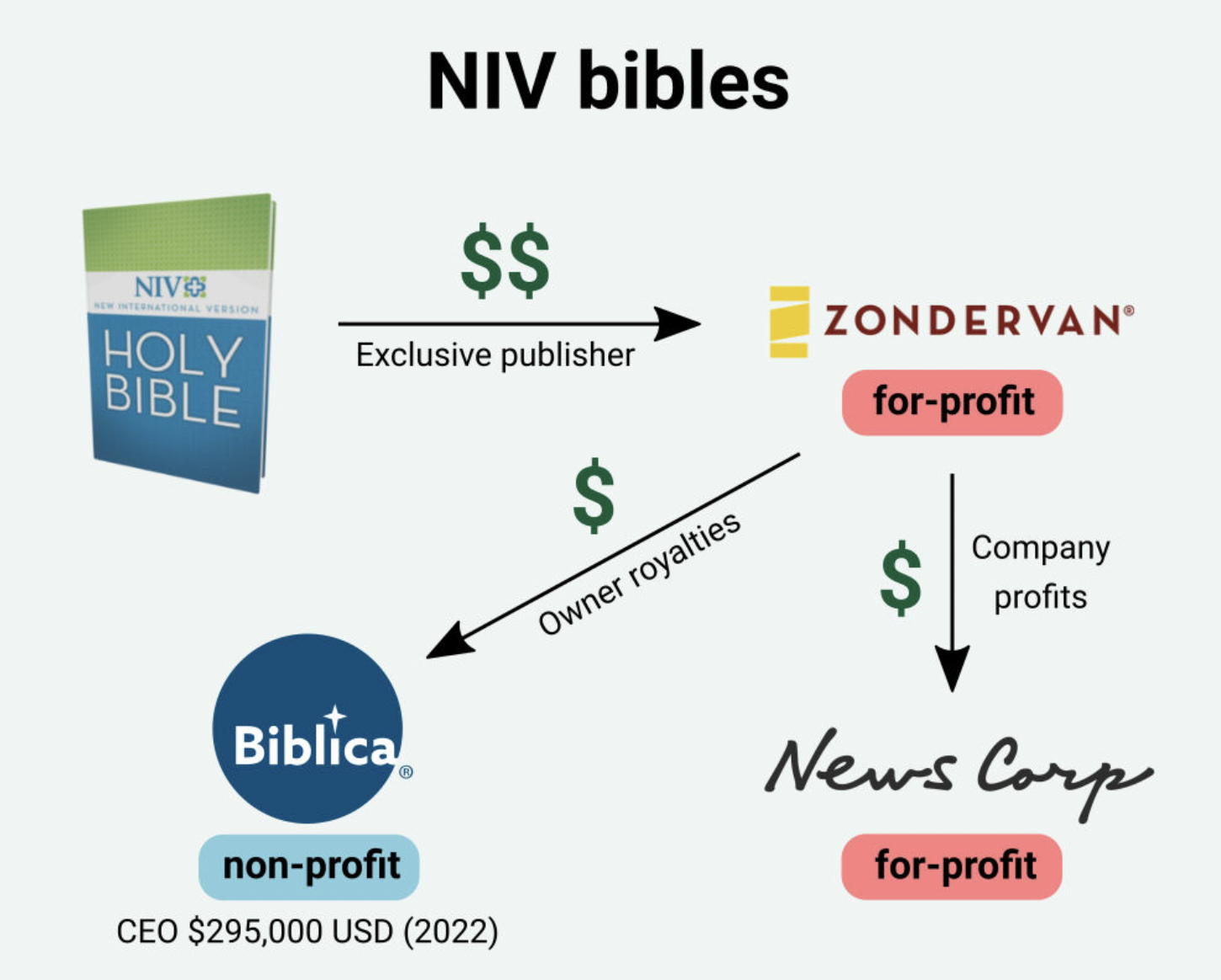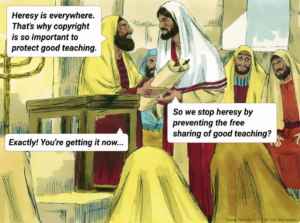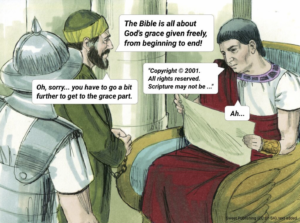Bible Publishers – Stewards or Gatekeepers?

Editor’s Note: This article was originally published by Selling Jesus, and is being reprinted with permission. The original includes footnotes and references that can be found here.
OPINION—Let’s imagine that your pastor gets up one Sunday morning and announces: “If anyone wants to share passages from the Bible they need to ask me for permission first. I have to do this in order to carefully steward God’s Word, because people might abuse it. That said, I’ll be very generous in giving permission. I’ll even let you share it for free if you’re only using small portions. But if you use large portions, I’ll expect some payment to cover the costs of carefully stewarding God’s Word.” How would you feel?

While that might be unthinkable for a pastor to do, it is exactly what most Bible publishers have been doing for decades. There are some exceptions, but for the purpose of this article we’ll be focusing on the most popular modern English translations that most Christians use today.
Bible publishers will, of course, argue that they are carefully stewarding God’s Word. Let’s evaluate that by asking several questions:
Is it legal to copy and share Scripture?
No, not in any reasonable sense when compared to any other commercial product. Almost all of the most popular English translations are copyrighted and, therefore, illegal to freely share. For example, would it be reasonable to say Harry Potter is legal to share because you can quote parts of it? Of course not.
Some argue that Bible publishers are “generous” in allowing quotations of Scripture up to certain limits, but any commercial work can be quoted in similar ways. Most countries have “fair use” or “fair dealing” exemptions that allow use of a work as long as it is “fair”, taking into consideration several factors, including how substantial the use is. So most people will be able to quote a significant number of verses from bibles whether they are granted permission to or not, especially those under a “fair use” system.
So while publishers do allow their Bible translations to be quoted up to certain limits, these terms do not go very far beyond what is already permissible under “fair use” laws, and in many cases are even more restrictive. The limits are as follows:

These limits are more permissive than fair use law in the sense that you are guaranteed to be able to use a certain number of verses, regardless of other factors. However, not by much. You still can’t share a substantial part such as an entire book, even if it is only 13 verses like 2 John. More significantly, you can’t share plain Scripture. Since Scripture can only comprise 25-50% of a work you have created, you must always accompany it with other commentary.
Access to MinistryWatch content is free. However, we hope you will support our work with your prayers and financial gifts. To make a donation, click here.
Some translations even try to unlawfully deny fair use rights, such as the ESV:
The ESV text may not be quoted in any publication made available to the public by a Creative Commons license. The ESV may not be translated in whole or in part into any other language.
You can legally ignore this claim as long as your use still falls under fair use/dealing exemptions.
So no, Scripture is not legal to copy and share in any reasonable sense. Not because of an oppressive government, but because of Christian publishers.
Are publishers generous with permission?
No. While they are not all the same, they all make it difficult to get permission, whether it is due to complicated application processes, slow responses, burdensome conditions, charging fees, or simply not granting permission.
- The non-commercial permission form for the NIV has 49 fields to fill out, including one for your “distribution and marketing strategy”.
- Crossway allowed the ESV to be used by open source Bible apps for some years, and then suddenly decided to stop and recoup licensing fees. Several open source Bible apps were then forced to remove it, resulting in these apps receiving very negative reviews from oblivious users (“Poor review due to the fact that ESV version is no longer available”).
- When I myself contacted Bible publishers for permission for a free app, some were quick to respond but 3 out of 7 didn’t respond at all.
- Some publishers will not grant permission to apps unless they are “truly unique and innovative”. Since users will generally shun apps unless they have their favorite translation, it is very difficult for any new apps to emerge, since it is the publishers who decide if something is “truly innovative” rather than actual users.
- Permission is so hard to get that some ministries boast when they have been granted it: “We have hard-to-get traction with Bible publishers, including a licensing commitment from Biblica”.
- When licensing the NIV for use in Bible commentaries, the publisher forbids any direct criticism of its rendering, which is an essential element of good textual criticism.
- Even just reading the entire Bible aloud in a public setting was forbidden by the American Bible Society for their Contemporary English Version.
While publishers might seem to be generous by making their translations freely available on certain websites like Bible Gateway, that is actually in part a strategy to increase print sales. The more popular your translation is online, the more print sales you’ll likely make. I’ve heard this confessed first-hand from those in the industry.
I recently made an app that allows anyone to print individual books of the Bible at home for free. It was denied permission by all the publishers I asked, except one who demanded money. The technology is open source, so they could use it themselves if they wanted to, adding whatever quality assurance they would like. Instead, it is clear that publishers do not want ordinary Christians to be able to print the Bible. They said so explicitly:
We do not however grant licenses for end-users to print their own editions, regardless of the amount of text they’re printing.
While sites like Bible Gateway allow you to print portions of a book, it maxes out at 10 chapters. There is also no special license granted for printing, so sharing a printout with anyone else is in many cases illegal, even though Christians often do it.

Do they commercialize Scripture?
Yes. To start with the clearest offender, the NKJV is a 100% for-profit translation owned by unbelievers. Job applications for Thomas Nelson simply redirect to its parent company (HarperCollins) which is a secular company, and is itself owned by News Corp.
While all the other organizations are non-profit, some of them have given exclusive publishing rights to for-profit companies. Biblica has given Zondervan exclusive rights in the US to print the NIV commercially, meaning a significant portion of the profits go to Zondervan’s owner (also News Corp), and no other Christian publishers can print the NIV.
Just like secular companies, Christian publishers have been printing special gimmicks to generate profit, even to the extent of exploiting Christian vices such as materialism and Christian nationalism. Some examples would be the $400 USD [correction, $399.99] ESV Pulpit Bible, the $140 NASB Founders’ [of America] Bible – Heirloom Edition, or the $55 NKJV American Patriot’s Bible.
Almost all Bible publishers distribute their translations via The Digital Bible Library, which is quite literally designed to restrict access to God’s Word. It’s an initiative by the largest Bible organizations, which requires all its members to “acknowledge the following”:
organizations employ various business models, including donation-based models, sales-based models, service-delivery models, among others. All of these models and hybrid models among them are considered reasonable and appropriate.
In other words, to be a member of the Digital Bible Library community you must agree that it is ok to commercialize Scripture as much as any other member may like. There is not even a requirement to be a non-profit organization.

Even then, the non-profit legal category itself only prevents owners from arbitrarily receiving money from their organization, but it doesn’t take into account personal profiting through high salaries and other compensation. The CEO for Crossway (owner of the ESV) in 2020 received a total of $423,927 USD in annual compensation for only 31 hours/week of work. While it is normal to pay CEOs large salaries to attract talent, that should not be necessary to motivate Christian CEOs.
Whether an organization is non-profit or not, to sell God’s Word with exclusive publishing arrangements is to commercialize Scripture. God’s Word has been made a commodity, providing well-paid job security to those who “steward” it. Those who labor in producing and updating translations should be financially supported, but many other organizations have managed to achieve that without resorting to selling God’s Word.
Do they ever give for free?
Sometimes. As already mentioned, you can find all these translations online for free in certain apps/websites. However, they usually expect some kind of commercial compensation from the website owner, such as royalty payments or displaying ads for their products. These agreements are all private, but my organization was offered use of a text (for free distribution) for $1,000 USD/year. I declined. This appears to be a common demand from most major translations. Ironically, if you want to share God’s Word for free, you often have to pay to do so.
Even when publishers do give for free, it is not always really for “free”. Every single one of the above mentioned translations collects your personal information when choosing to download their translation for offline use in YouVersion (the most popular Bible app). Notably, they also collect your name and country, which is not ideal for persecuted Christians were that data to ever get leaked.
Publishers have in fact been reluctant to make their translations free online, and have been very slow to do so, fearing a drop in print sales. Not too long ago, many of these translations charged a fee to download them in apps like YouVersion. During that time, in 2011, Biblica/Zondervan made the NIV free to download for a limited time, explicitly as a marketing strategy to generate more print and digital sales:
This limited offer ends next Tuesday … That’s when you’ll also be able to pick up the NIV in print at retailers everywhere. We’d like to thank Biblica and Zondervan once again for making the NIV available offline.
Charging fees for offline use in the 2010s was a blatant money-making strategy. In terms of technology, it would cost less to let people read offline than to have them keep downloading the text from servers. Publishers forced users to pay for something that would actually decrease distribution expenses. This was especially greedy in that time given bandwidth was more limited and mobile payment plans more expensive.
Some publishers like Biblica and Tyndale have encouragingly been more open with some of their resources, which is a step in the right direction. However, their most popular Bible translations remain restricted.
Do they actually protect Scripture?
No. While publishers try to protect Scripture through copyright, this is ineffective and does more harm than good:
- Copyright more commonly prevents those with good intentions from using Scripture, as those with bad intentions may well ignore the copyright anyway
- Christians generally trust sources of content rather than the copyright-status of content. The KJV is public domain in most countries and yet malicious modifications have not been a wide problem as there are numerous trustworthy sources of the text.
- Even with the current licensing conditions of modern translations, someone could publish blasphemous material as long as Scripture only took up a quarter of the total content.
What publishers do prevent is the sharing of pure Scripture. None of their public licenses allow copying and sharing plain Scripture. You are always forced to add your own commentary to it. You can’t even share a parable of Jesus by itself, as many oblivious Christians have done without permission over the years.
Fears of bad things happening if people have free access to Scripture is not without historical precedent, as Catholic clergy had the same fears when ordinary believers started to access Scripture through translations into the vernacular. Henry Knighton (a Catholic historian) criticized John Wycliffe’s translation into English on the grounds that ordinary believers could not be trusted to safeguard Scripture as clergy could:
The Gospel, which Christ gave to the clergy … that they might administer it to the laity … that Master John Wyclif translated from Latin … so that he made that common and open to the laity … and spread the Evangelists’ pearls to be trampled by swine. [emphasis added]
Pope Pius IV in 1584 reluctantly allowed translations in the vernacular, but only if one had written permission from a bishop:
if the Holy Bible, translated into the vulgar tongue, be indiscriminately allowed to every one, the rashness of men will cause more evil than good to arise from it, it is, on this point, referred to the judgment of the bishops or inquisitors, who may, … permit the reading of the Bible translated into the vulgar tongue … and this permission must be had in writing.
Publishers today likewise believe they have been entrusted by God with the task of stewarding his Word and that they cannot trust ordinary believers to print or publish it themselves. Instead, anyone wanting to do so must receive permission from them.
To be truly free, all Bible translations should be public domain, relying on the church to uphold good teaching rather than secular law courts. However, for the sake of argument, if these organizations really wanted to ensure ‘purity of text’ they could make use of the popular Creative Commons Attribution-NonCommercial-NoDerivatives license. This license would mean anyone can freely share Scripture as long as they don’t modify or commercialize it. None of these Bible publishers have chosen to make use of it. It is entirely fair to conclude then that they are not just concerned about purity of text, but rather the control of the text. As Dr. Maurice Robinson puts it in his 1996 paper The Bondage of the Word: Copyright and the Bible:
It is not the “purity of the text” which has to be protected, but the liberation of that text from those non-church entities who desire to profit unjustly from marketing God’s word back to God’s people
Are these publishers really worthy of such control? I received the following response from a publisher which was concerned that someone might try make money off their translation, were they to let me integrate it into one of my apps:
I want to add something in the text that we can find if the text you distribute makes it into a commercial venture. Put your thinking cap on on[sic] what we may do. Maybe we repeat a word in a verse in Eccleslastes[sic] or we misspell a word in John
This was for a modern English translation widely trusted by Reformed Evangelicals. I refused (politely) to corrupt Scripture in that way and they never ended up giving me the permission I needed for their text. They obviously didn’t intend on changing the meaning of the text, but they were willing to put an intentional mistake into God’s holy Word for the sake of controlling it.

Would God want his Word to be “stewarded” in this way?
No. God’s Word is the only tangible thing we have in this world that we can truly call “holy” (Rom 1:2), and yet we have let it be commercialized. Scripture cannot be chained (2 Tim 2:9) yet publishers may well sue you if you try and share it in a way they don’t approve. They call it “God’s Word” but really believe it belongs to them. A handful of monetization strategists at these organizations decide how millions of believers can and can’t use God’s Word. We celebrate smuggling bibles into hostile countries and yet forbid anyone from copying and sharing Scripture with their neighbor. We say the Reformation put God’s Word back into the hands of ordinary believers, but it has once more been taken away by modern day publishers.
Should a believer be allowed to share some of God’s Word, but be forbidden from sharing the whole counsel of God? Should it be lawful to share Scripture with commentary, but a crime to share Jesus using just his own words?
You might think this article is aimed towards Bible publishers. It is in fact aimed towards the church. Commercial publishers have made clear what they think “stewarding” looks like, and have stubbornly resisted numerous calls for freer access for decades now. It is instead up to the church to stop promoting these restricted translations, to ensure a future where God’s Word is free to be shared. The church must stop turning a blind eye to the commercial nature of these translations, and start taking seriously free alternatives.
A future generation of Christians will look back and remember the 21st century as the time when the sharing of God’s Word was restricted by Christians themselves, and it was called “godly”. Even more perplexing will be why churches allowed it to happen in the first place.
It is most fitting to end this article in the words of the translations themselves:
- NIV — “Unlike so many, we do not peddle the word of God”
- ESV — “For we are not, like so many, peddlers of God’s word”
- NLT — “You see, we are not like the many hucksters who preach”
- NKJV — “For we are not, as so many, peddling the word of God”
- NRSV — “For we are not peddlers of God’s word like so many”
- NASB — “For we are not like the many, peddling the word of God”
- CSB — “For we do not market the word of God”
- LSB — “For we are not like many, peddling the word of God”
Instead, we speak with sincerity in Christ, as from God and before God. (2 Corinthians 2:17)

A free alternative
I hope when this article is read in 10 years time there will be plenty of good free translations to recommend. For now, I recommend just one: The Berean Standard Bible (BSB). It is the first modern English translation to be translated straight from the original languages, overseen by scholars, and dedicated to the public domain. Which means you can use it however you need to, without breaking any rules. You are probably not familiar with it because it was only freed from copyright this year (2023).
The most important characteristic of a translation is, of course, accuracy, but the main way Christians adopt new translations is through trust. While the major translations have endorsements from famous pastors, that is not the best way to evaluate a new translation.
Which is why you should start reading the BSB and comparing it to other translations yourself right now. There is no need to “switch” to it, because reading multiple translations is always a better practice. So simply start adding the BSB into the mix. Quote it in Bible studies and discipleship resources without having to worry about breaking any rules. Once you are confident in its quality, you may even start preaching from it, as I have. And so have the joy of knowing the words that come out of your mouth are truly free, as God intended.
* To avoid all doubt, recommending the BSB is entirely my own decision and I do not benefit from it in any way. If you would like a professionally printed Bible, the only option I currently know of is from the creators of the BSB, and they have already expressed a desire to see others start to arrange professional printing themselves as well. Unlike other translations, there is no exclusive publishing deal, so anyone can do this at any time.



